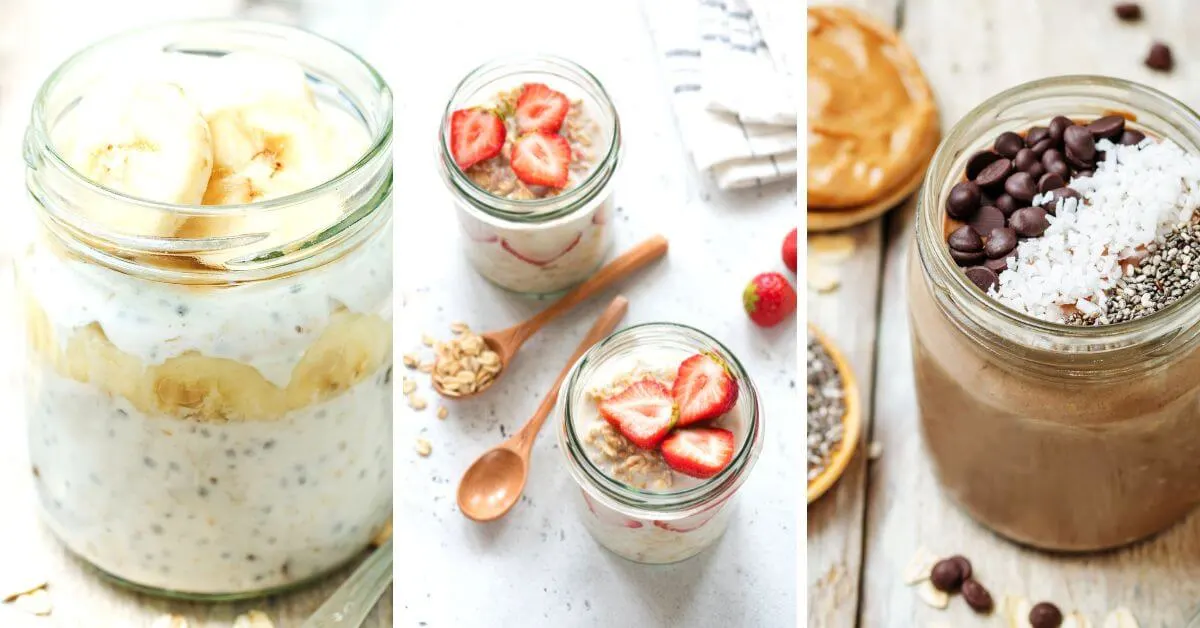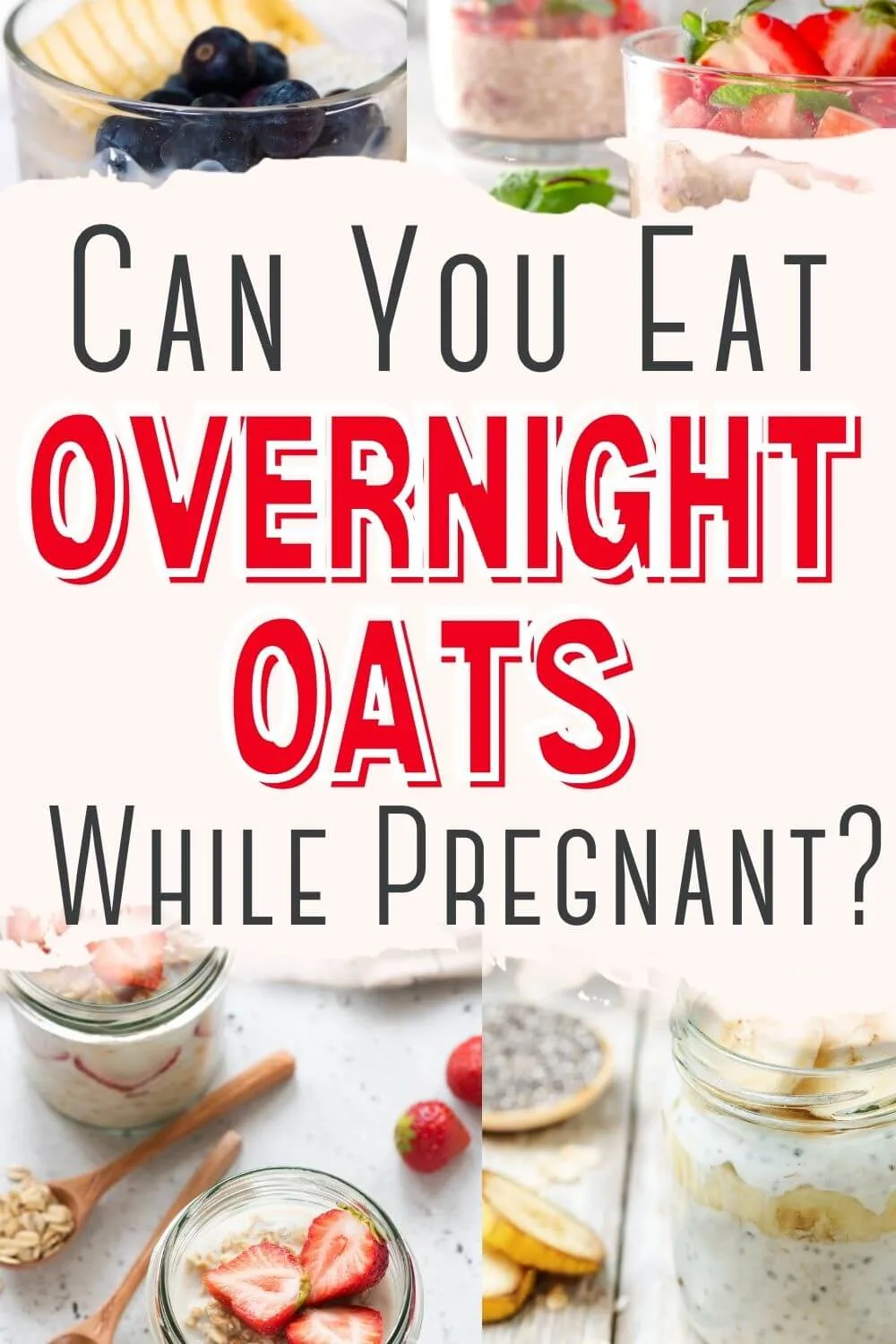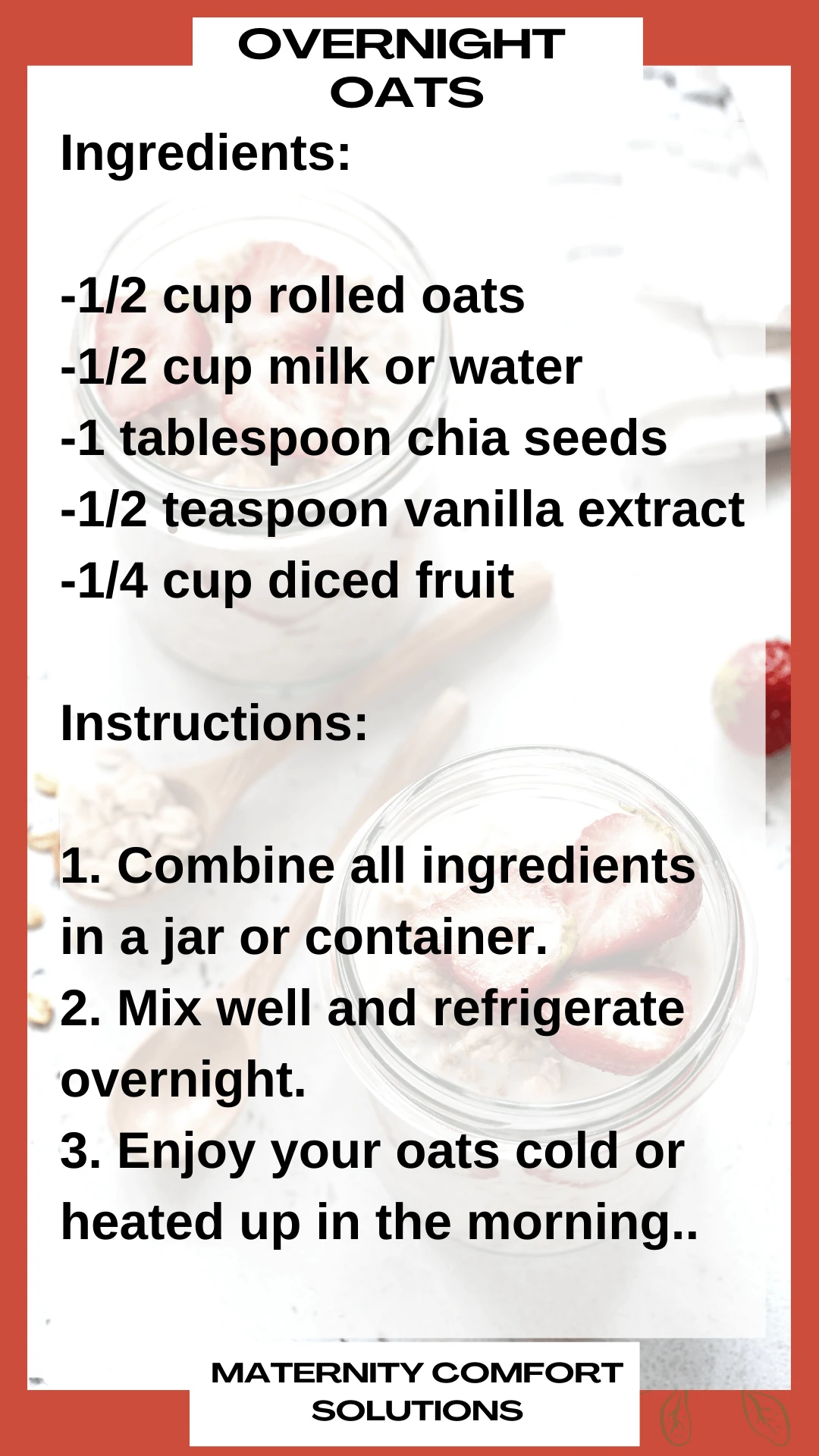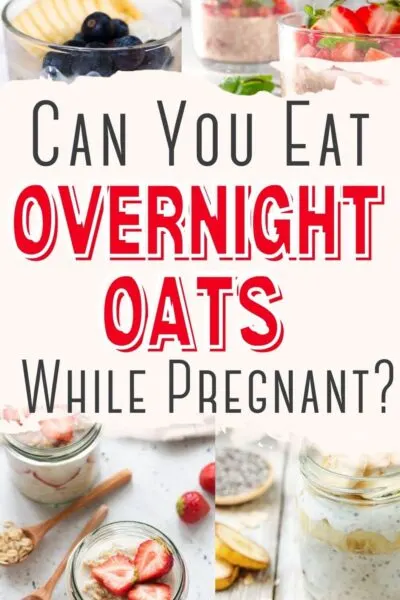Updated May 8, 2023
Overnight oats are a great option for a quick and healthy breakfast or snack, but you may be wondering if Is it safe to eat overnight oats while pregnant?
If you’re like most pregnant women, you’re always on the lookout for healthy and convenient foods that will help you get the nutrients you and your baby need.
Overnight oats are simply oats that have been soaked in milk or water overnight.
This allows them to soften and absorb the liquid, which makes them much easier to digest than raw oats.

I was on bed rest for most of my pregnancy with my first child.
It was rough, as I was constantly bored and a little stir-crazy.
My husband would bring me dinner every night, but by the time he got home from work, I was usually already asleep.
That’s when I started making overnight oats.
It was so easy to just mix some oats, milk, and chia seeds in a jar and let them sit in the fridge overnight.
In the morning, I’d have a delicious breakfast waiting for me, and it kept me full until lunchtime.
Is it safe to eat overnight oats while pregnant?
Overnight oats are a good source of fiber, protein, and minerals like iron and magnesium.
So, are overnight oats safe to eat during pregnancy?
Yes, overnight oats are safe to eat during pregnancy as long as they’re prepared with pasteurized milk or water.
Raw milk and unpasteurized dairy products can contain harmful bacteria that can put you and your baby at risk for foodborne illness.
To make sure your overnight oats are safe to eat, be sure to use pasteurized milk or water and warm them thoroughly before eating.
You can bump up the nutrition in your overnight oats by adding delicious toppings and mix-ins:
- Fruit: Strawberries, bananas, blueberries, mango, pineapple, and apples are a few fresh fruit options that will take your overnight oats to the next level.
- Chia Seeds: Chia seeds are safe to eat during pregnancy and are loaded with nutritional health benefits.
- Yogurt: Adding yogurt to your overnight oats is an amazing way to boost the calcium in your overnight oats, especially if you made them with water. Yogurt also adds a creaminess and fullness to the overnight oats.
- Maple syrup: If you love maple and brown sugar oatmeal then add a little maple syrup to your overnight oats to sweeten them.
- Brown sugar: Sprinkle a little brown sugar in your overnight oats. Brown sugar is a natural sweetener and a little goes a long way.
- Honey: Honey is another amazing natural sweetener you can add to your overnight oats.
- Peanut Butter: You can add a scoop of peanut butter to your overnight oats to bump up the protein and flavor. Peanut butter is generally considered safe to eat during pregnancy, as long you do not have a peanut allergy.
- If you’re looking for a nutritious and convenient option for breakfast or a snack during pregnancy, overnight oats are a great choice.
Just be sure to prepare them with pasteurized milk or water to keep you and your unborn baby safe.
I love to make them with Oatmilk, but you can make them with regular milk, almond milk, rice milk, coconut milk, or water.

Benefits of oats during pregnancy:
Eating oatmeal for breakfast is one of our favorite ways to kick off the day!
Oatmeal is cheap, simple to prepare, and is great for your health.
When you prepare your list of superfoods during pregnancy, you want oatmeal at the top of your list.
Overnight oats are a nutrition-filled power boost for pregnancy:
- Overnight oats are a good source of fiber, which can help keep you regular and prevent constipation, a common problem during pregnancy. Fiber also helps you stay fuller longer between meals.
- Oats are an excellent source of protein, which is important for your baby’s growth and development. If you don’t feel like meat, fish, or beans a warm bowl of oatmeal can help you meet your protein requirements during pregnancy.
- They are a great source of iron, which is essential for pregnant pregnant women to prevent iron deficiency anemia in pregnancy.
- Overnight oats are a good source of magnesium, which can help relieve pregnancy-related aches and pains. Magnesium plays a critical role in muscle and nerve function, low magnesium can increase the risk of heart disease, type 2 diabetes, and high blood pressure.
- Overnight oats are packed with vitamins and make a healthy option for breakfast or a snack during pregnancy.
- Suffering from morning sickness or other digestive issues in your pregnancy? Soaking your oats overnight helps to break down the starches in the oats making them easier on your queasy pregnancy stomach.
- Oats are inexpensive and easily prepared! Overnight oats take only a few minutes to prepare and are ready for breakfast in the morning. It doesn’t get much easier.
Oats during pregnancy first trimester
Overnight oats are safe to eat in the first trimester.
If you’re currently pregnant or hoping to become pregnant, you may be wondering if there are any foods that can help give your baby a healthy start in life.
While there are many different options out there, one food that you may want to consider adding to your diet is oats.
Oats are a good source of folate, which is important for neural tube development.
They’re also high in fiber, which can help prevent constipation (a common issue during pregnancy).
In addition, oats contain phytochemicals that may help reduce the risk of certain birth defects.
One easy way to add oats to your diet is to make overnight oats.
Simply combine rolled oats with milk, yogurt, and fruit (such as bananas or berries) and let it sit overnight in the refrigerator.
I could only keep down starchy carbs during the first trimester of pregnancy.
Oatmeal was my go-to if I couldn’t have pancakes which was another rare food I could keep down.
Oats are rich in folate and thiamine, which are necessary for your unborn baby’s brain development.
Thiamine also helps you convert carbohydrates into energy, so go ahead and enjoy a jar of overnight oats for breakfast or lunch!
Oats during pregnancy second trimester
The second trimester of pregnancy is often referred to as the “golden period” because most women feel their best during this time.
However, it’s also important to remember that what you eat during pregnancy can have a profound impact on your health and the health of your baby.
One food that is particularly beneficial during the second trimester is oats. Oats are packed with nutrients like fiber, iron, and magnesium, which are all important for pregnant women.
They also have a unique type of soluble fiber called beta-glucan, which has been shown to reduce cholesterol levels and improve blood sugar control.
Plus, oats are a versatile ingredient that can be enjoyed in many different ways – from overnight oats to oatmeal cookies.
How to prepare oats for pregnancy:
Here’s a quick and easy recipe for overnight oats that you can try at home:
Ingredients:
-1/2 cup rolled oats
-1/2 cup milk or water
-1 tablespoon chia seeds
-1/2 teaspoon vanilla extract
-1/4 cup diced fruit
Instructions:
1. Combine all ingredients in a jar or container.
2. Mix well and refrigerate overnight.
3. Enjoy your oats cold or heated up in the morning.
Note: If you’re using water, you may want to add a little bit more sweetness with honey or a natural sweetener.
You can also add different fruits or spices to change the flavor.
Can you eat maple and brown sugar oatmeal while pregnant?
Maple and brown sugar oatmeal is a delicious and healthy option for pregnant women.
The overnight oats are quick and easy to make, and the sweetness of the maple syrup and brown sugar makes them especially satisfying.
Plus, the addition of fruits and nuts provides even more essential nutrients.
Pregnancy is an amazing time in a woman’s life when her body is changing to accommodate a new life.
Along with these changes comes an increased need for certain nutrients, including iron, folic acid, and calcium.
Oatmeal is a great source of these nutrients, making it an ideal breakfast choice for pregnant women.
Additionally, oatmeal helps to regulate blood sugar levels, which can be helpful in preventing morning sickness.
Can I eat apple cinnamon oatmeal while pregnant?
Yes, you can eat apple cinnamon oatmeal while pregnant.
Similar to maple and brown sugar oatmeal you can buy instant oatmeal that is apple and cinnamon flavored.
The healthiest option is to make your homemade version using quick oats, cinnamon, and apples.
You can make cinnamon and apple overnight oats too!
Can oatmeal help increase breast milk supply?
Oatmeal is one of the foods we recommend breastfeeding moms eat if they are trying to increase their breastmilk supply.
One of the most important things you need to do to increase your breast milk supply is to stay extremely well hydrated.
Overnight oats that are soaked in milk or water are an excellent way to help you increase your fluid intake.
Plan to add overnight oats to your postpartum meal plan to increase breast milk supply and, aid in your postpartum recovery.

Can I overnight oats that have not been refrigerated?
If you’re using milk, it’s important to refrigerate your oats overnight to prevent the growth of bacteria.
If you’re using water, you can soak your oats at room temperature, but if you are pregnant you need to refrigerate your overnight oats.
You run a risk of getting a food-borne illness if you eat soaked oats that have sat out in the “danger zones” which are temperatures between 40 degrees and 140 degrees Fahrenheit.
It isn’t worth the risk during pregnancy, refrigerate your oats overnight, and if you want to be extra safe heat them before you eat them.
Soaked oats are best used within 3-4 days.
Do not eat oatmeal that has been sitting out for more than 2 hours.
The Most Common Food-Borne Illnesses
- Listeria
- Salmonella
- E Coli
- Mold
- Campylobacter
- Botulism
These pathogenic bacteria can be found in foods that are not kept at the proper temperature, stored improperly, or that are undercooked.
To reduce your risk of foodborne illness during pregnancy you want to pay close attention to how you prepare, cook and store the foods you eat.
So make sure you keep your oats in a cool, dry place and in a pest-proof container before use.
Prepared oats should be kept in the refrigerator if not consumed immediately.
Common symptoms of a severe foodborne illness from eating fermented foods and undercooked foods are:
- Nausea
- Vomiting
- Diarrhea
- Stomach cramps
- Fever
If you develop any of these symptoms after eating, you should contact your doctor or midwife.
Foods to avoid during pregnancy
- Foods that are not pasteurized– certain types of cheese like soft cheeses, Brie, Gorgonzola Blue Cheese, etc.
- Certain types of fish– shark, swordfish, tilefish, anything high in mercury
- Raw eggs including egg nog, hollandaise sauce, homemade mayonnaise, and runny eggs.
- Undercooked meats– lunch meats. Deli meats.
- Hot foods that are not “hot”, avoid hot foods that have been sitting out without a warming source. Same for foods that should be eaten cold. If no ice or refrigeration source is keeping the food cold, take a pass.
- Caffeine– soda, chocolate, and energy drinks. (Limit your caffeine to less than 200 mg a day)
- Herbal Teas (There are so many ingredients in herbal teas so it is best to avoid them simply. Green tea is OK.)
List of Foods you should eat during pregnancy:
- Avocado
- Oatmeal
- Pinto Beans
- Black beans
- Arugula
- Bananas
- Dark Green Leafy Vegetables
- Brussel sprouts
- Carrots
- Green Beans
- Eggs
- Lean Meats
- Apples
- Oranges
- Sweet potato
- Tomatoes
- Melon
- Berries
What should a pregnant woman eat daily?
A pregnant woman needs to consume a variety of nutrients every day to support both her health and the development of her baby.
Protein is essential for building new tissue and can be found in meat, poultry, fish, legumes, and eggs.
Calcium is necessary for strong bones and teeth and is especially important during the third trimester when the baby’s skeleton is rapidly developing.
Pregnant women should aim to get 1000 mg of calcium per day from low-fat dairy products such as milk, yogurt, and cheese.
Iron is also important for the formation of new blood cells, and pregnant women need about 27 mg of iron per day.
Final Thoughts
To sum it up, overnight oats are a healthy and convenient option for breakfast or a snack during pregnancy.
You can and should enjoy overnight oats during your first, second, and third trimester of pregnancy.
Don’t forget to include oats in your postpartum meal plan if you are breastfeeding.



